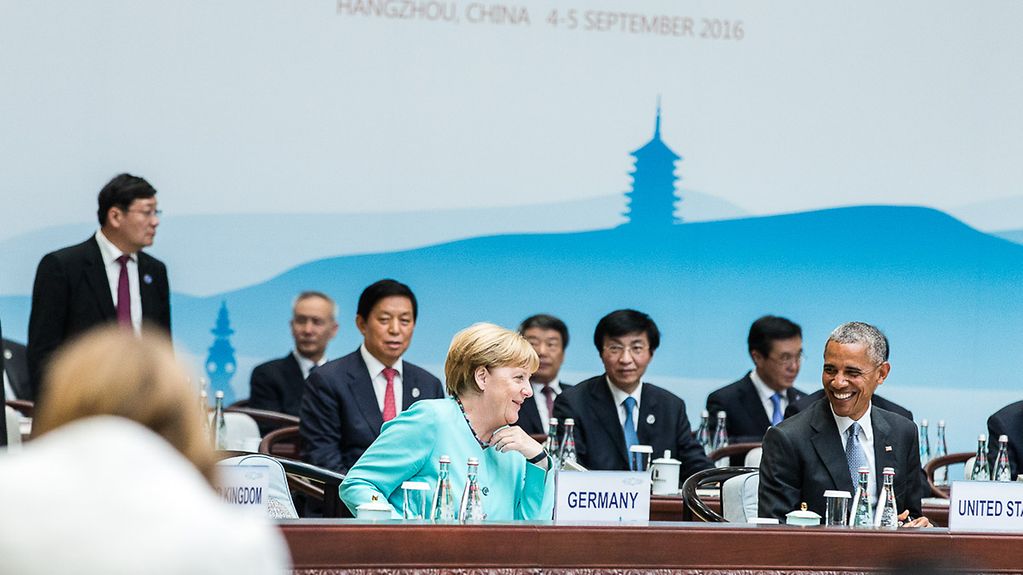Angela Merkel at the G20 summit in China
The global economy needs new impetus. At the close of the G20 summit, the Chancellor announced that projects now agreed would be reviewed during the German Presidency. It is important to combine sustainable growth with social responsibility, she said.

Chancellor Angela Merkel at the first session of the G20 summit in the Chinese city of Hangzhou
Photo: Bundesregierung/Denzel
For the 12th time, the heads of state and government of the 19 leading industrial nations and the European Union met for a G20 summit. Chancellor Angela Merkel flew to the city of Hangzhou in eastern China, where the summit took place on Sunday and Monday.
In the leaders’ communiqué, the heads of state and government of the industrialised states and emerging economies (known collectively as the G20) agreed on a package of activities to revitalise the world’s sluggish economy. The G20 called for greater solidarity in the face of the refugee crisis and greater efforts in the field of climate action.
Growth opportunities for all
Talks focused on the development of the global economy. To this end, said the Chancellor, important findings are laid out in the leaders’ communiqué:
- In view of weaker than desirable global economic growth, the Chinese G20 Presidency calls for joint action, and places its faith in action plans.
- One special focus will be digitalisation, which is seen as a driver of growth.
- The heads of state and government reaffirm that they will be forging ahead with the programme agreed one year ago on base erosion and profit shifting (BEPS).
- A new global forum within the framework of the OECD is to focus on overcapacities, for instance in the steel sector.
- And developing countries are to receive assistance to help them enhance their capacities to collect taxes.
The Chancellor also declared that not all impacts of globalisation are positive. Social responsibility and the fight against inequality are important issues, said Angela Merkel. All nations ought to be in a position to benefit from economic growth: industrialised nations, emerging economies and developing countries.
Progress on climate change mitigation
The heads of state and government also discussed climate change mitigation. "The question of China’s sustainable growth is now inextricably linked to energy policy and climate change mitigation," said Angela Merkel.
China and the United States of America have announced the ratification of the Paris climate agreement. This marks a radical change, said the Chancellor. "I can remember G20 summits at which the word ‘climate’ could not be mentioned. Today, the USA and China are two of the nations that are pushing strongly for the implementation of the Paris agreement, including newly developed financing instruments."
Tasks facing the German Presidency
Germany will take over the G20 Presidency from China. The next summit is scheduled to take place next year in Hamburg. "We can continue much of the work launched here during China’s Presidency during our German Presidency," said the Chancellor. The sustainable development goals to be achieved by 2030 played a major part in the deliberations of the G20, which looked at how the G20 nations could help achieve these. This will also feature largely during Germany’s Presidency.
"During our Presidency we will also look in depth at health, firstly with a view to resistance to antibiotics and secondly in terms of how the global community can respond better to international pandemics thanks to the experience gained with Ebola," explained Angela Merkel.
Political discussions on Ukraine and Syria
The heads of state and government also made the most of this opportunity to engage in numerous separate meetings. Many of them looked at the civil war in Syria and the conflict in eastern Ukraine.
Angela Merkel met, for instance, with the Presidents of Russia, the USA and France to discuss the situation in Ukraine. "All sides affirm their commitment to the Minsk agreements, but nothing has actually happened at operational level; for that we need Ukraine too," said Angela Merkel. On Sunday she discussed the situation in eastern Ukraine with Russian President Vladimir Putin. "They looked very specifically at how the Minsk process can be continued," reported federal government spokesperson Steffen Seibert. They also discussed the continuing civil war in Syria.
Syria conflict dominated many meetings
The EU-Turkey Agreement was on the agenda of a meeting with Turkish President Recep Tayyip Erdoğan. "I have already met the Turkish President for bilateral talks and will be meeting him again today with the Italian Prime Minister and the French President," reported the Chancellor on Monday.
On Sunday, Angela Merkel reported on her first meeting with President Erdoğan. They discussed the rights of members of the German Bundestag to visit German troops stationed at the Turkish airbase in İncirlik, as well as the refugee agreement with the European Union and the question of visa liberalisation for Turkish citizens.
Angela Merkel stressed that they had also discussed "the disastrous situation in Syria". "We agreed above all that the political process in Syria must get back on track," said the Chancellor on Sunday.
Like the G7, the Group of Twenty (G20) is an informal forum, with a focus on international cooperation on financial and economic issues. Together the G20 states represent about 80 per cent of global GDP (gross domestic product), three quarters of global trade and about two thirds of the world’s population. G20 resolutions send a strong signal and trigger reforms at national and multinational level.